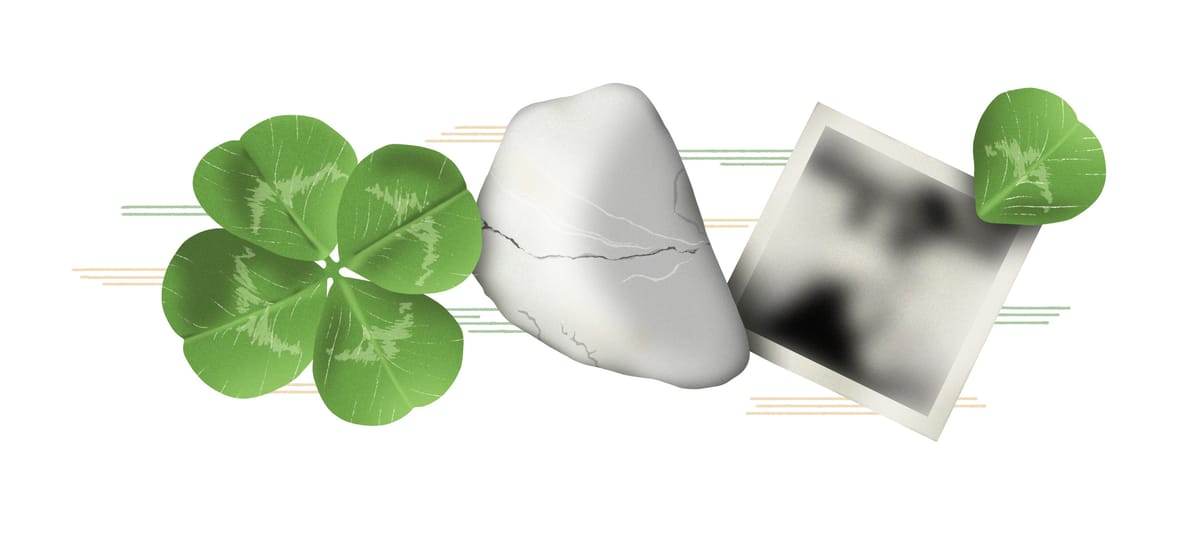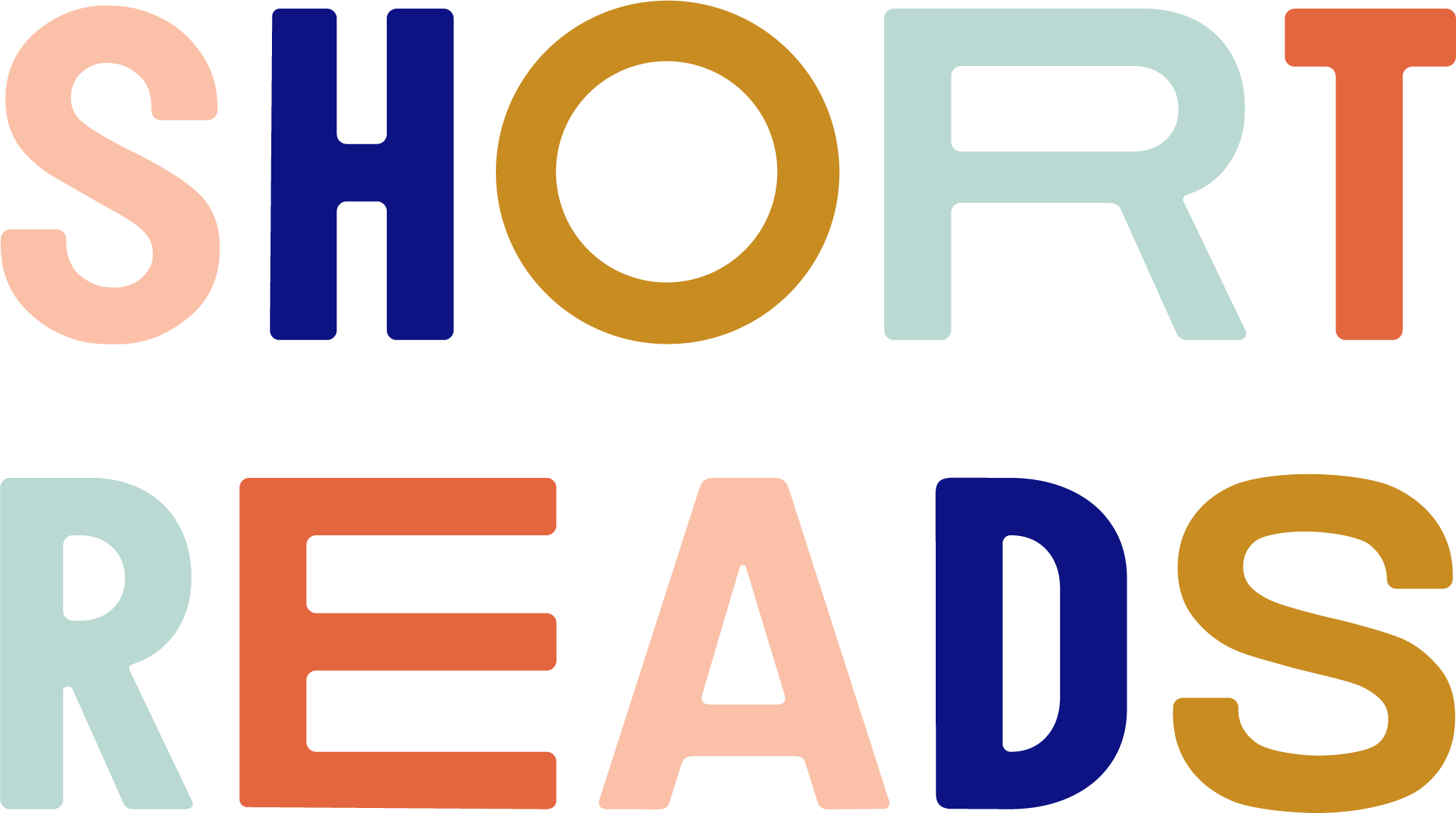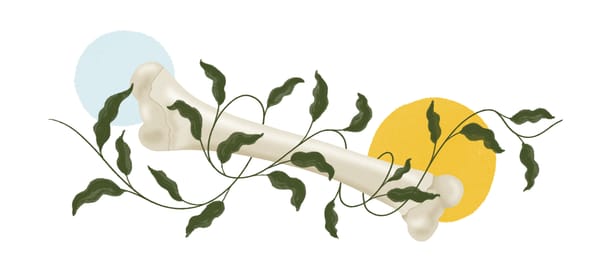Touchstones
by Mimi Schwartz | What the living carry.

I biked to my husband’s grave yesterday, and it was hotter out than I expected. I lay down on the grass in front of his name, and the ground felt hard but good, the cool grass thick with three-leaf clovers. There must be four-leaf clovers here, I said to the silence, and felt the urge to find some to put on his gravestone for luck. But they would shrivel and die so quickly; in the ground between us, they live unseen. I stretched out under the strands of light making their way through the leaves of the old oak above us. I pressed my body downward, toward him, dozing.
A dog barked somewhere. I stood up, reaching to touch the cold marble gravestone, but it had warmed in the sun. I traced my finger over the carved letters, STUART, the edges still sharp after ten years, the stone clean except for one brownish spot. I tried to rub it out with torn leaves dipped into my water bottle, but the stain stayed. I would clean it better next time.
I rearranged the half-dozen stones sitting on top of the gravestone, a Jewish tradition. We—his children, grandchildren, friends, and I—had gathered them from his favorite haunts to hold quiet his spirit with the weight of our remembrance. Some stones had disappeared; a few lay scattered on the ground, including a smooth white beauty, my favorite. I put back what I could.
When they lower me beside Stu, my name MIMI carved next to his, we will share the four-leaf clovers scattered above us and lie waiting for whoever comes to feel close.
~~~
The last time I visited my father-in-law, Charlie, in the nursing home, he was struggling for breath, his chest heaving, the rattling so loud that I had to whisper, We love you, but it is all right to let go. I held his hand, stroking its thinness until his breath steadied into sleep, and I left, thinking Stuart should come early the next morning.
An hour later we got the call that he had died. He was eighty-four.
I still think of him, wondering if I should have stayed and kept stroking his hand, the way I rubbed his son’s back thirty years ago, after Stu had a heart attack. For days in the ICU, I rubbed and stroked to keep Death away, whispering over and over, Stay alive, I need you. We need you! He was forty-eight.
We both believed those back rubs kept him alive. Not the heavy rubs we used for muscle aches, not light fingertips dancing as foreplay across his broad back and shoulders. No, these were gentle circles saying complete me. And they did, until that last attack in a strange hospital with an arrogant hospitalist ordering that Stu’s bed be moved behind a glass wall with no entry, where I could watch him but not touch him. I watched them load him out to the helicopter that flew him to another hospital, where they let me say goodbye. His hand was too cold to stroke, his forehead too cold for kissing, but everyone, including me, pretended he was alive, that I did say goodbye, that he felt my hand in his.
~~~
In the photo I am four, curled like a kitten, sitting in my father’s lap. We are in the blue chair by the fire, on 110th Street in Queens, and still now, I feel his chest rise and fall, the thump of his heart, its steady strength. He with his silky bald head, his lips about to smile, me in a starched sailor dress, as we watch the flames dance before us. My mother’s arms surely held me countless times, but I can only bring back her perfume tickling my nose. My small hands tickled my sister Ruth’s back, but I feel only the cool of the dimes she paid me for massages—ten cents for twenty minutes. What warmed me most, then and now, is the silky fur of my beagle, Bobby, my scratching behind his ear, his tongue licking my nose for no charge other than the pleasure it gave us both.
~~~
As a child, I shied away from touching old people. They hugged too hard, with too much desperation. My older cousin Marten was also to be avoided. He put grapes down my blouse that felt squishy and stained my budding breasts red. He laughed, and I hated him, though I was okay with the boys who brushed against my breasts while playing touch football in the PS 3 schoolyard and, later, spinning the bottle in dimly lit basements. And after that, my first love’s hands wandering over me as we slow danced in the den for hours to Sinatra, feeling our way into the surprise of desire. That’s still there inside at eighty-four (Charlie’s age that night in the nursing home), as I lie with Rob, my partner now, in our bed by the big window, holding close and touching to make each other feel alive and invulnerable to the sickness and death that are out there—but not here, not now.
Mimi Schwartz’s books include Good Neighbors, Bad Times: Echoes of My Father’s German Village; Thoughts from a Queen-Sized Bed; Writing True: The Art and Craft of Creative Nonfiction (with Sondra Perl); and When History Is Personal, among others. Recent essays have appeared in Lilith, Ploughshares, Gray Love, The Boston Globe, Pangyrus, Kelsey Review, and Assay. She is professor emerita in writing at Stockton University and lives in Princeton. For more about the author, go to www.mimischwartz.net.
This essay is a Short Reads original.
From the archive
Sep 18, 2024
“JFK”
by Jesse Lee Kercheval | Sibling rivalry. Sep 20, 2023
“Bones”
by Heather Osterman-Davis | Stuck in the middle, together.
Want more like this? Subscribe to Short Reads and get one fresh flash essay—for free—in your inbox every Wednesday. Or become a supporting subscriber and help us pay writers.






